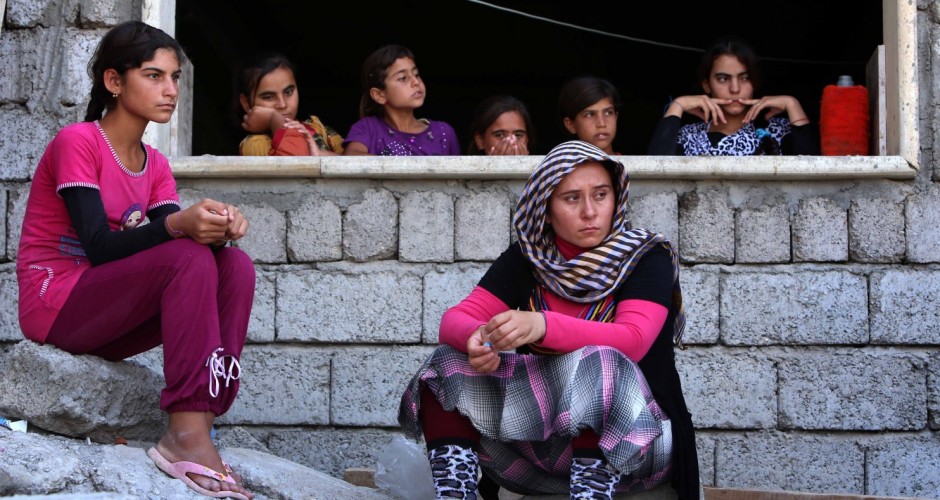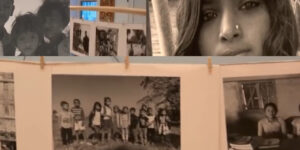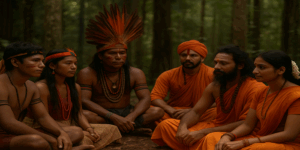BAGHDAD — Stranded on a barren mountaintop, thousands of minority Iraqis are faced with a bleak choice: descend and risk slaughter at the hands of the encircled Sunni extremists or sit tight and risk dying of thirst.
Humanitarian agencies said Tuesday that between 10,000 and 40,000 civilians remain trapped on Mount Sinjar since being driven out of surrounding villages and the town of Sinjar two days earlier. But the mountain that had looked like a refuge is becoming a graveyard for their children.
Unable to dig deep into the rocky mountainside, displaced families said they have buried young and elderly victims of the harsh conditions in shallow graves, their bodies covered with stones. Iraqi government planes attempted to airdrop bottled water to the mountain on Monday night but reached few of those marooned.
“There are children dying on the mountain, on the roads,” said Marzio Babille, the Iraq representative for the United Nations Children’s Fund (UNICEF). “There is no water, there is no vegetation, they are completely cut off and surrounded by Islamic State. It’s a disaster, a total disaster.”
Most of those who fled Sinjar are from the minority Yazidi sect, which melds parts of ancient Zoroastrianism with Christianity and Islam. They are considered by the al-Qaeda-inspired Islamic State to be devil worshippers and apostates.
The dramatic advance of the extremist Sunni fighters has torn the ethnic and religious fabric of the country, with Christians and Shiites also uprooted from cities and towns.

A Yazidi woman cries in Dohuk in Kurdistan, where she and others are taking shelter. Tens of thousands of Iraq’s Yazidi minority sect have fled the town of Sinjar to escape violence at the hands of Sunni extremists. (Safin Hamed/AFP/Getty Images)
The dramatic advance of the extremist Sunni fighters has torn the ethnic and religious fabric of the country, with Christians and Shiites also uprooted from cities and towns.
The Islamic State’s takeover of Sinjar, the first major setback for Kurdish forces protecting the country’s north, sent about 200,000 people fleeing, according to the United Nations. Some 147,000 have arrived in the semi-autonomous Kurdish region, flooding refugee camps.
Most of those stranded on Mount Sinjar had run out of battery life on their cellphones by Tuesday, but the few that still could communicate gave grim updates.
On Tuesday, 10 children and one elderly woman died, while on Monday, seven children had perished, said 23-year-old Shihab Balki, who was trapped with his mother, sister and four brothers. “I saw their bodies with my own eyes.”
He later texted the news of another casualty: a young man who had died of thirst, leaving his wife and five children behind. UNICEF said that 40 children had died after being displaced from their homes in the area in the 48 hours ending Monday night, including an unknown number on the mountain. The agency did not have figures for Tuesday.
In Baghdad, parliamentarians complained bitterly about the plight of the displaced, their discussions temporarily overshadowing wrangling over the nomination of a prime minister.
“Children have died because of dehydration and lack of food,” Vian Dakheel, a Yazidi parliamentarian from Sinjar, said through tears. “My people are being slaughtered,” she continued, referring to reports of mass killings of those who had stayed behind.

This image made from video taken Aug. 3 shows Iraqis from the Yazidi community arriving in Irbil in northern Iraq after Islamic militants attacked the towns of Sinjar and Zunmar. (AP)
The ancient and secretive Yazidi sect, whose members number no more than 600,000 across Iraq, has suffered persecution for centuries.
Islamic State posted the first pictures of its capture of Sinjar on social networking sites on Tuesday. One showed six men lying face-down in a field, a pistol pointed at the backs of their heads. “Kill them wherever you find them,” read the caption.
Salem al-Sinjari, a 45-year-old teacher, said he’d seen around 25 bodies piled in the streets as he fled Sunday, leaving early enough to catch a ride to the Kurdish region. His mother, five brothers and two sisters wound up besieged on the mountain. He said he last spoke to them Monday before their last cellphone battery died.
Iraqi Kurdish security forces known as pesh merga are attempting to secure a road from the mountain to the nearby city of Rabia, but the process involves clearing villages where locals are sympathetic to the militants, said Majid Shingali, another local parliamentarian, who left Sinjar on Saturday.
Kurdish factions in neighboring Syria say they are entering Iraq to assist this country’s Kurds as they face Islamic State along a 650-mile front.
The Kurdistan Workers’ Party (PKK), designated a terrorist organization by the United States for its armed struggle against the Turkish state, also called for all Kurdish factions to unite against the Sunni extremists.
Babille, UNICEF’s Iraq representative, said that U.N. agencies have offered the Iraqi government technical assistance with airdrops but have yet to be asked for help. At least 15 to 20 flights would be needed just to provide those stranded with enough water and supplies to survive for a week, he said.
“We need to get them out,” he said. “If we don’t, it would be catastrophic.”
By Loveday Morris

































